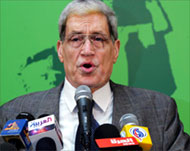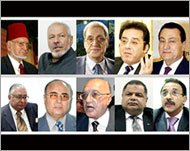Egypt campaign ends in run-up to vote
Egypt’s presidential election campaign has officially ended as an election committee spokesman said thousands of monitors wouldn’t be allowed in polling stations.

“We have explained more than once that whoever wants to monitor can do so outside the polling stations,” Osama Attawiya said on Sunday. “But monitoring from inside is a right to all the representatives of the candidates.”
Political activists pushing for the monitoring of the election planned to contest the committee’s decision and demand a ruling by Egypt’s administrative court allowing the monitors to enter polling stations be enforced.
Egypt’s government earlier rejected allowing international monitors observe the poll, claiming it infringes on Egyptian sovereignty and is opposed by Egyptians sensitive to their country’s colonial past.
The campaign season was a novelty for Egyptians, who had previously only voted at referendums at which they were asked to vote “yes” or “no” for the incumbent. Mubarak has won previous referendums with more than 90% of the vote.
Minor harassment alleged
A key challenger to President Hosni Mubarak complained on Sunday of minor harassment from the ruling party’s supporters.
 |
|
Wafd leader Numan Gumaa said |
Wafd Party leader Noaman Gomaa also said the three-week campaign was not long enough but praised the coverage he received from state-owned media ahead of Wednesday’s first presidential polls open to more than one candidate.
Gomaa was among a handful of the 10 candidates to deliver speeches at the end of the official campaigning period.
“We didn’t have enough time to personally communicate with all the provinces and the people,” Gomaa told reporters. “There is harassment, but it hasn’t reached an annoying level.”
Gomaa alleged members or supporters of Mubarak’s ruling National Democratic Party tore down his “humble posters”.
“The president did not order the posters be torn down, it was the behavior of those people who have grown accustomed to power,” he said, arguing that Mubarak’s 24-year term in office has created centres of unwieldy political power.
Gomaa also said he was worried about possible election day violations but did not elaborate. Political activists have accused Mubarak’s government of rigging elections.
Mubarak address
Mubarak also addressed thousands of supporters in front of Abdeen palace in downtown Cairo, appealing to Egyptians to vote for him in a speech broadcast live on a privately owned Egyptian satellite station.
 |
|
Egyptian candidates (top from R |
“The age of referendums and pledging allegiances is over,” Mubarak assured the whistling, clapping crowd.
“Those who want to support me, should give me their voice and who are convinced by my vision and my program must express that in the ballot boxes.”
Mubarak earlier told Egypt’s Al-Masry al-Youm daily that some government bodies have taken time to adjust to Egypt’s new political landscape, capped off by Wednesday’s polls.
“The experience is new for us, government and opposition. It’s only normal that there will be some mistakes,” he said. “I was forced to personally intervene more than once to give instructions that ensure the state’s neutrality in elections and equal opportunity for the 10 candidates.”
Gomaa, however, said there were some positives during the campaign, in particular the coverage from Egypt’s state-run media outlets.
“The Egyptian television treated us well and gave us opportunities,” he said. “The governmental press was reasonable to a great extent.”
The pro-reform movement Kifaya, which is calling for an end to Mubarak’s rule, announced plans to stage a protest in downtown Cairo’s Tahrir Square on election day, raising concerns about possible confrontations with security forces.